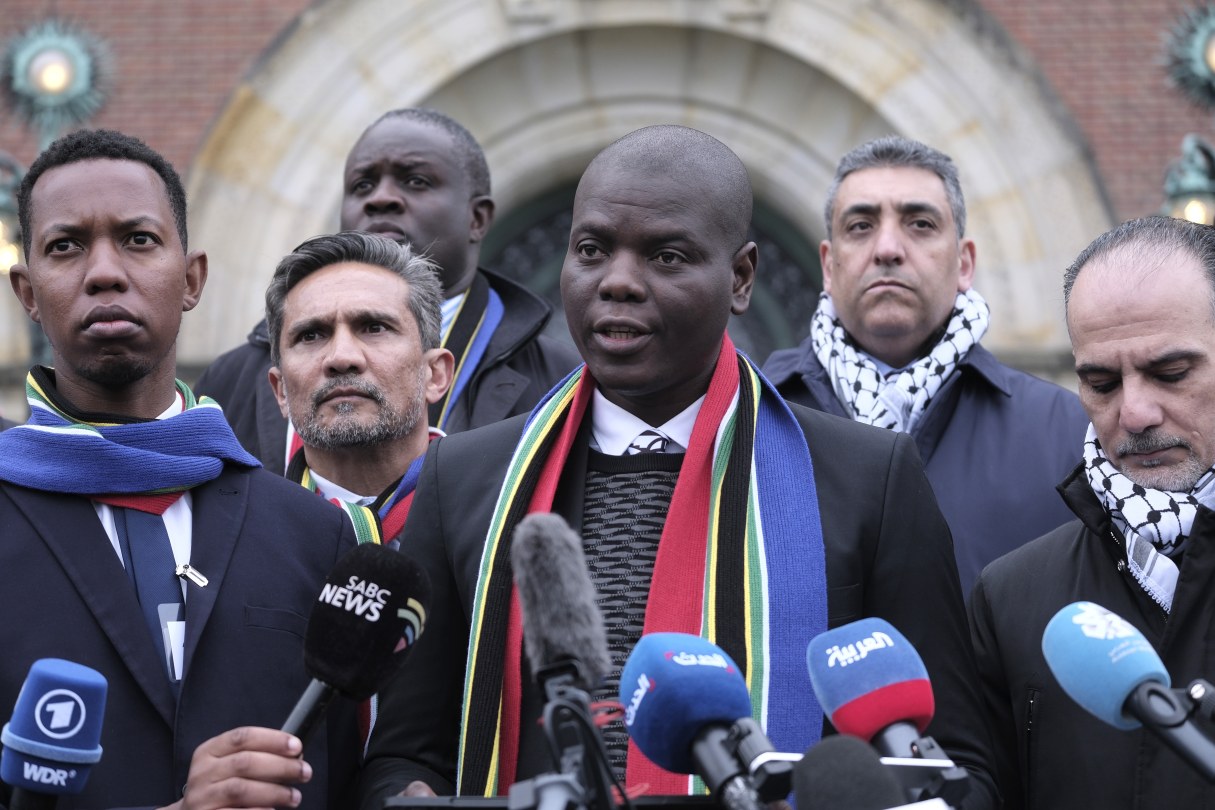- Broadening the Legal Horizon : South-Africa’s Legal Stand
Israeli-Palestinian conflict exceeds the frontiers of the Middle East and it remains a major concern for the international community for a long time. Does this latter expect from any state other than Palestine to commence a contentious case before the ICJ against Israel for its actions in the Palestinian territories?
Not long after Israel attacked the occupied Palestinian territories on October 27 2023, a State 7,000 kilometers away from Gaza, answered this question on 29 December 2023. The Republic of South Africa, initiated proceedings against Israel. It alleged that Israel ‘has breached and continues to breach its obligations’ under the Convention on the Prevention and Punishment of the Crime of Genocide in the Gaza Strip.
According to South Africa, Israel has failed to prevent genocide and to prosecute direct and overt incitement to genocide, particularly since October 7, 2023. More gravely, Israel has committed, is committing and risks continuing to commit acts of genocide against the Palestinian people in Gaza.
For discussing South Africa’s role in this case, we must first address some procedural rules governing contentious proceedings. When a State files an application for initiating contentious proceedings, the Court must primarily answer the question whether it has jurisdiction to deal with the case. Afterwards, for the Court to be able to adjudicate, the State that asserting the violations of international law must have a legal entitlement to bring that specific claim before the Court, namely have locus standi, as a matter of admissibility of the claim. In this regard, the case initiated by South Africa is likely to tackle a question that poses a long-term challenge to the development of international law in terms of the entitlement to invoke State responsibility. The rest of the article will discuss whether any state party to the Genocide Convention can bring claims relating to its breach before the Court.
In this case, the question is as follows: Is South Africa the actor entitled to invoke Israel’s responsibility?
Traditionally, The Court’s dispute settlement mechanism is based on a bilateral structure. When an obligation under international law directly owed to a state is violated by another state, the former, as the injured state, has a legal right or interest to bring the matter to court. In such a situation, a state asserts its own and direct rights, having a “special interest” in the perpetrator state’s compliance with international legal norms, as reflected in Article 42 of ARSIWA. On the other hand, it is established in the Diallo Case with reference to customary international law (para.39) that a State can adopt claims of its nationals whose rights are allegedly violated in another State and assert them through diplomatic protection. In this sense, a State in fact relies on an indirect right when exercising diplomatic protection. South Africa’s claims, evidently, fall outside the scope of the latter, as the victims of Israel’s actions are not South African nationals. In fact, in its application, South Africa’s claims are not substantiated on either of these grounds. By asserting Israel’s responsibility, South Africa relies on erga omnes and erga omnes partes character of the obligations owed by States under the Genocide Convention.
As mentioned earlier, erga omnes obligations, by their very nature, concern all States and all States may be deemed to have a legal interest in their protection. When such obligations emerge within the context of a treaty, the term “all States” should be interpreted as encompassing all the States that are parties to the treaty. In this case, the obligations incumbent on each State party to the treaty can be described as erga omnes partes. In order to demonstrate that the Genocide Convention has an erga omnes partes character, it is worthwhile to look at the “behind the scenes” of the Convention. Moreover, this proposition has been confirmed by the Court itself.
The UNGA, unanimously adopted the Genocide Convention and defined the ‘genocide’ as the denial of the right of all human groups to exist, and it is a crime under international law and is contrary to moral law and the spirit and purposes of the UN. The GA’s perception demonstrates two points: primarily, the principles enshrined in the Convention are recognized by civilized nations and are therefore binding under customary international law even in the absence of such a convention. In addition to its universal character, the intention of the States that concluded this treaty was in no way to create a bilateral web of rights and obligations towards each other. In Reservations to Convention on Prevention and Punishment of Crime of Genocide Advisory Opinion, the Court, briefly explained this fact as (page 12):
‘[I]n such a convention the contracting States do not have any interests of their own ; they merely have, one and all, a common interest, namely, the accomplishment of those high purposes which are the raison d’être of the convention.’
Under the Court’s jurisprudence, if the purpose of the contracting parties of a Convention is to guarantee a common interest, the obligations imposed thereby may be defined as obligations erga omnes partes. Under the Genocide Convention, having a human rights treaty character State parties undertake a duty to protect national, ethnical, racial, or religious communities. In that regard, we cannot speak of individual rights or advantages conferred on States parties. Hence it is clear that States did not consider their individual interests when they formed this Convention; rather, they sought to ensure a common interest in the improvement of humanity. It can be thus concluded that the genocide convention is of erga omnes partes.
In Gambia v Myanmar Case, the Court has found that ‘any State party to the Genocide Convention, and not only a specially affected State, may invoke the responsibility of another State party with a view to ascertaining the alleged failure to comply with its obligations erga omnes partes, and to bring that failure to an end.’. (paras. 41-2)
Moreover, if a special interest were required to assert a breach of this Convention, no State would be in a position to bring a claim in the cases where the perpetrator state committed genocide against populations under its jurisdiction. (para.108)
The Court’s judgment seems to confirm the binding force of Article 48 of the ARSIWA. Article 48 paragraph (1) subparagraph (a) of the ARSIWA permits any State other than an injured State to invoke the responsibility of another State if the breached obligations owed to a group of States and established to protect a collective interest of the group. This article was considered by ad hoc Judge Sur not as a custom but as a progressive development of international law. It was, however, deemed by Judge Simma in the Armed Activities Case to be part of the contemporary law of state responsibility.
It is also worth noting here that the ICJ first recognized in 2012, in Questions Relating to the Obligation to Prosecute or Extradite Case, that Belgium, as a non-injured state, has standing to invoke the responsibility of perpetrator state, since it is a party to Convention Against Torture on the basis of the common interests protected by this Convention. (para.70) In 2022, in Application of the Convention on the Prevention and Punishment of the Crime of Genocide Case (Gambia v Myanmar), the Court similarly recognized Gambia’s legal interest in claiming violations of the Genocide Convention by Myanmar against Rohingya people, which is an ethnic minority. (para.112)
In the present case before us, South Africa contended that it ‘has prima facie standing’ to submit to the Court its dispute with Israel on the basis of alleged violations of obligations under the Genocide Convention. Besides, as can be seen in the order of January 26, 2024, for provisional measures, Israel did not challenge the standing of South Africa in the proceedings. As for the Court, it dealt with the issue in a single paragraph, admitting that South Africa had prima facie standing. (para.34) Further, neither Judge Sebutinde in her dissenting opinion, nor ad hoc Judge Barak in this separate opinion tackled the issue of standing. Most importantly, Judge Xue, who objected to the entitlement of a non-injured state to assert breaches of this type of obligations in Belgium v Senegal (para.14) and Gambia v Myanmar (para.11) cases, finally changed her position and accepted that ‘Court should recognize the legal standing of a State party to the Genocide Convention to institute proceedings on the basis of erga omnes partes to invoke the responsibility of another State party for the breach of its obligations under the Genocide Convention.’.
Thus, it can be concluded that the Court has, finally, unanimously acknowledged the legal interest and consequently, the locus standi of a contracting party to assert breaches of erga omnes partes obligations before the Court.





